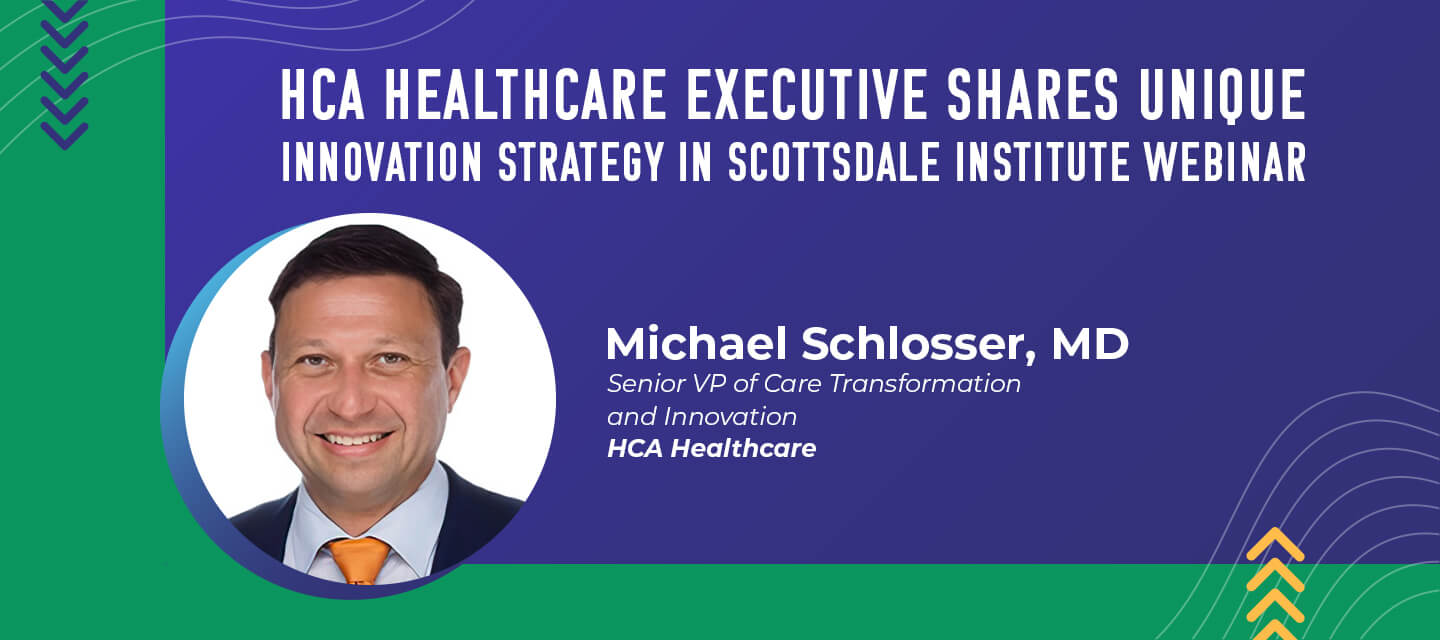What does a Department of Care Transformation and Innovation do? HCA Healthcare Senior Vice President of Care Transformation and Innovation Michael Schlosser, MD, MBA, FAANS, explained how his team was formed and some of their intriguing advancements in a recent Scottsdale Institute webinar.
Like most healthcare organizations, HCA faced surging patient volumes, labor shortages, and new care models as a result of the COVID-19 pandemic. Dr. Schlosser, who advocates for digitally enabled care, approached CEO Sam Hazen with the idea of establishing a dedicated team focused on leveraging advanced technology to solve these issues. He received Hazen’s unwavering support, and HCA’s Department of Care Transformation and Innovation was born.
By 2026, CT&I aims to deliver a step change in patient and care team outcomes through the integration of technology into care. The program combines insights from frontline clinicians and robust data with advanced technologies and change management expertise to address complex challenges. Throughout the webinar, Dr. Schlosser highlighted several CT&I advancements and their anticipated impact on care delivery.
A human-centered approach to transforming care
Historically, EHRs were largely designed to serve the needs of regulatory bodies and other stakeholders; clinicians bore the brunt of capturing and maintaining this information without directly receiving any value. Dr. Schlosser recognized that technology already available to HCA could be deployed differently, enabling CT&I to develop significant improvements for care teams.
To better understand their challenges, Dr. Schlosser and his team work elbow-to-elbow with clinicians at HCA’s two innovation hubs, UCF Lake Nona Hospital (Orlando, FL) and TriStar Hendersonville Medical Center (Hendersonville, TN). The physicians and nurses who staff these hubs also sign on to be clinician innovators, a requirement that fosters engagement. In these collaborative environments, CT&I’s human-centered approach to care transformation has flourished.
In his Scottsdale Institute webinar, Dr. Schlosser focused on two projects recently implemented at HCA:
Matching staff skills with patient needs
TimpaniSM, HCA’s care team allocation project, ensures participating hospitals have the right person in the right place at the right time to deliver the best care. Machine algorithms analyze staff talent levels and preferences, patient volume, cost data, and other outputs to develop an automated schedule that matches staff skills and competencies with patient needs and risk profiles. The result is an ideal schedule that balances costs, patient demand, and staff requests. A nurse leader reviews the final schedule to ensure human oversight. Since the program’s launch, these hospitals have honored 98% of nurses’ “request not to work” shifts.
Timpani is LIVE in nine hospitals, and Dr. Schlosser expects it to be rolled out in 80 more facilities next year. In addition, the organization is adding a generative AI layer to support scheduling adjustments on the fly and automate the nurse notification process via text messaging.
Reducing the burden of physician documentation
CT&I is also leveraging AI to streamline physician documentation. Working with Augmedix, CT&I developed a fully AI ambient speech technology solution, which the team has rolled out to 75 physicians in four emergency departments. The project aims to derive discrete data for documentation by training the AI tool to listen to a conversation, transcribe it, and break down that transcription into structured data elements.
Dr. Schlosser anticipates that, by the middle of 2024, the solution will be in the hands of most ED physicians at HCA.
Partnerships Matter
Dr. Schlosser credited technology partners MEDITECH and Google with playing a significant role in CT&I’s success. Implementing MEDITECH Expanse as its foundational EHR enables HCA to develop a core set of corporate standards.
“Our EHR is designed to be a more collaborative ecosystem, not just a one-size-fits-all EHR where the EHR vendor dictates workflow and innovation,” he explained. “MEDITECH works with us and with Google to determine how we can bring the best technology and insights into the platform. This is a critical part of our journey.”
Google Cloud provides the next-generation approach to organizing and storing data across the health system. Utilizing Google’s cloud infrastructure and AI solutions, HCA’s data has become a strategic asset.
With the support of their technology partners, CT&I has helped the organization to become a real-time learning healthcare system. Their innovative projects have tackled inefficiencies and established core solutions that can be implemented at HCA’s 3,000+ care sites.
Scottsdale Institute members can watch the full webinar on their website. Stay tuned for opportunities to join future Scottsdale Institute webinars sponsored by MEDITECH.


